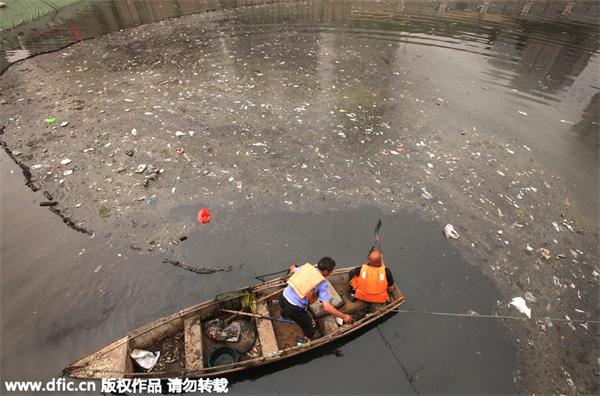 |
|
Chinese workers clean a heavily polluted canal running through central Beijing on May 16, 2010. [Photo/IC] |
As the second-largest economy in the world, China is not only playing an increasing influential role in the global economy, but also leading changes that would have been unthinkable even a decade ago. It is establishing new norms and rules in global aid and has successfully challenged the traditional aid architecture prevalent for the past half century. And the newly established Asian Infrastructure Investment Bank has displaced the once-seemingly irreplaceable American and Japanese domination of development plans for Asia.
Laudable though its economic growth and other achievements have been, they have come at significant costs to its water, air and soil, which pose a threat to human health and the environment. Signs of water stress can be seen all over China, both in terms of quantity and quality. Much of this is because of poor planning and bad management. It has resulted in the disappearance and pollution of numerous rivers and the consequences that come with it.
The Yellow River has frequently run dry before reaching the sea because of extensive diversion of water, mostly for agriculture, eroding what used to be an ecologically rich delta. More recently, the level of Poyang Lake, the largest freshwater lake in the middle of the Yangtze River, dropped radically because of drought and consistent overuse of water.
In terms of water quality, discharges of untreated or partly treated industrial and domestic wastes have seriously contaminated water bodies in different parts of the country. These include a drastic increase in the release of carcinogenic substances by Jilin Petroleum and Chemical Co into the Songhua River which, together with the Heilongjiang River, forms the natural border with Russia; heavy metal contamination in the Hejiang River because of discharge of industrial waste from mines, many of them operating illegally; oil spills in the Bohai Bay, one of the fastest growing industrial regions; and floating dead pigs in Huangpu River, a source of drinking water for Shanghai.

I’ve lived in China for quite a considerable time including my graduate school years, travelled and worked in a few cities and still choose my destination taking into consideration the density of smog or PM2.5 particulate matter in the region.